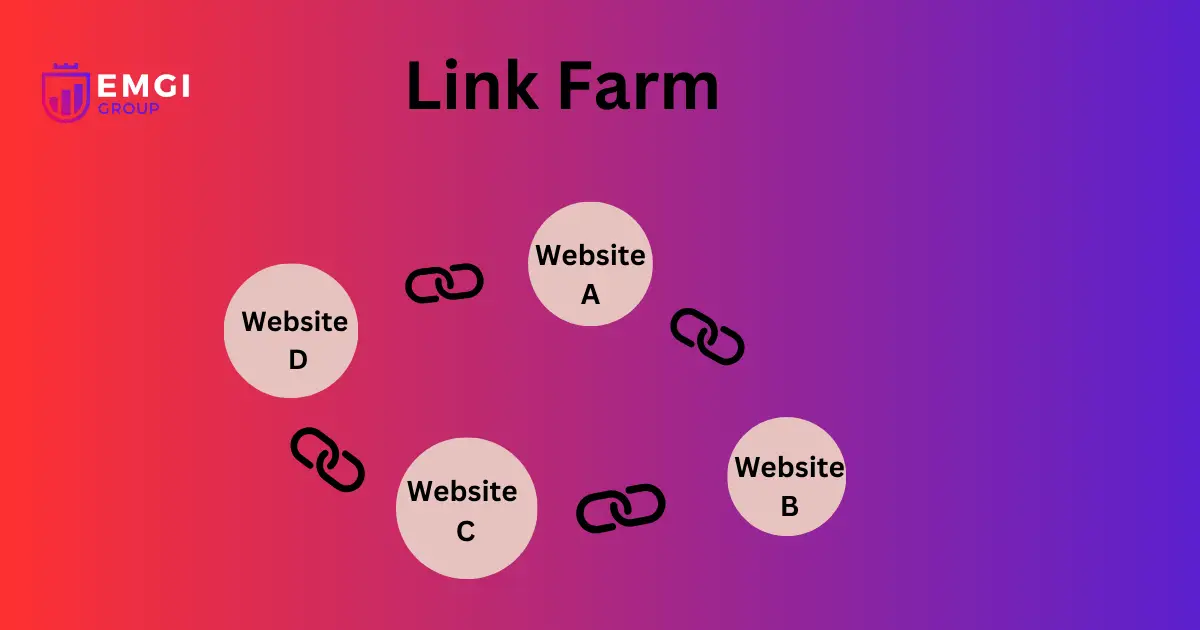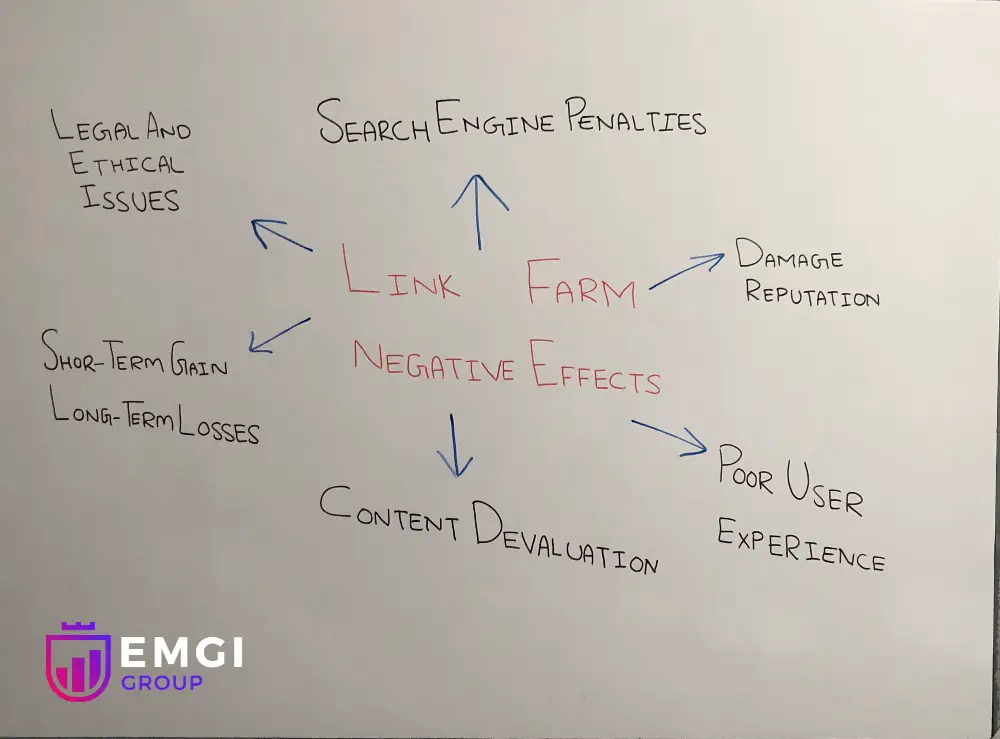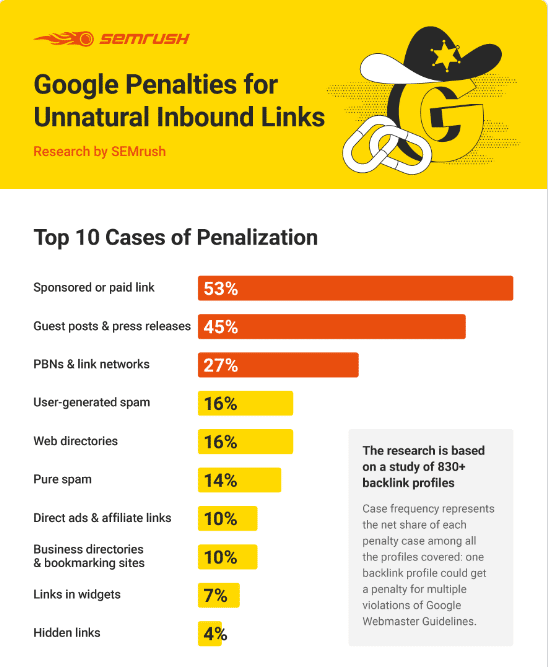
- Last Updated:
Link farms are networks of websites created specifically to manipulate search engine rankings by exchanging numerous links between them. These networks aim to artificially inflate the number of backlinks to a site, thereby boosting its perceived authority and search engine position. For a SaaS website, engaging with link farms seems tempting due to the potential for a rapid increase in backlinks. However, practice is highly risky and discouraged. The primary SEO effect is a potential drop in rankings, or even complete de-indexing if caught and results in a significant loss of visibility and organic traffic.
The negative effects of link farms in SEO are search engine penalties, damage to reputation, poor user experience, devaluation of content, short-term gains, long-term losses, and legal and ethical issues. To identify link farms look for a basic templated design, spot on unrelated topics, and evaluate poorly written articles.
Avoid link farms include search engine penalties, damage to credibility, low-quality links, risk of blacklisting, and wasted resources. The alternatives to link farms are guest blogging, content marketing, digital pr, broken link building, skyscraper technique, and social media engagement. The other black hat Seo techniques are private blog networks(PBNs), keyword stuffing, cloaking, spam blog comments, and redirect linking.
This ultimate guide provides in-depth details of a link farm, the negative effects of link farms in Seo, identifying link farms, avoiding link farms, alternatives of link farms, other black hat SEO techniques, and everything in between.
Table of Contents
ToggleWhat Is a Link Farm?
A link farm is a network of websites designed to artificially inflate link popularity by linking to each other. These networks are often created to manipulate search engine rankings through low-quality or spammy links that come under Spamdexing, also known as web spamming.
Link farms are a black hat SEO tactic used to boost a website’s authority by generating numerous backlinks from interconnected sites. The manipulation of link metrics aims to deceive search engines into ranking the site higher than it deserves based on genuine relevance and quality.
Additionally, search engines have evolved to detect and penalize link farms, recognizing that they provide little value to users and degrade the quality of search results. Engaging in link farming leads to severe penalties, including reduced rankings and even complete removal from search engine indexes.
How Do Link Farms Work?
Link farms work by creating a network of interconnected websites that link to each other to artificially boost search engine rankings. The manipulation increases a site’s perceived authority and relevance, though search engines now actively penalize such practices.
Are Link Farms Important for SEO?
No, link farms are not important for SEO. They are considered a black hat technique that results in penalties from search engines, harms your website’s reputation, and ultimately undermines your SEO efforts rather than improve them
Is Link Farm Bad?
Yes, link farms are bad. They violate search engine guidelines, leading to severe penalties, damage to a website’s reputation, and poor user experience. Additionally, they result in short-term gains but cause long-term harm to a site’s SEO and credibility.
What Are the Negative Effects of Link Farms In SEO?
The negative effects of link farms in SEO are search engine penalties, damage to reputation, poor user experience, devaluation of content, short-term gains, long-term losses, and legal and ethical issues.
The following image shows the negative effects of link farms in SEO:

The following are the negative effects of link farms in SEO:
Damage to Reputation
Link farms harm a website’s reputation by associating it with low-quality or spammy sites. The negative association erodes trust with users and potential partners, making it difficult to build or maintain a positive online image.
Poor User Experience
Link farms typically offer a poor user experience due to their low-quality design and irrelevant content. Users visiting these sites are often met with cluttered pages filled with unrelated links, which lead to frustration and high bounce rates.
Search Engine Penalties
Engaging in link farming results in severe penalties from search engines like Google. These penalties often lead to a drop in search rankings or even a complete removal from search engine results, severely impacting a website’s visibility and organic traffic.
The following image shows the google penalities for unnatural inbound links:

Devaluation of Content
When a website is linked from a link farm, the value of its content is significantly diminished. Search engines and users may perceive the content as less credible or authoritative, reducing its overall effectiveness and impact.
Short-Term Gains, Long-Term Losses
While link farms might offer quick SEO benefits, these gains are usually short-lived. Over time, the negative consequences, such as search engine penalties and loss of credibility, outweigh the initial advantages, leading to long-term damage.
Legal and Ethical Issues
Link farming leads to legal and ethical issues, including violations of search engine guidelines and potential disputes with content creators. The practice is often considered deceptive and results in legal action or sanctions against the involved parties.
How to Identify a Link Farm or Spamdexing?
To identify link farms look for a basic templated design, spot on unrelated topics, evaluate poorly written articles, search for very little original content, scrutinize ambiguous’ about page’ information, and count many external links.
The following are ways to identify link farms:
Look for a Basic or Templated Design
Link farms often feature basic or templated designs that lack originality and creativity. These sites are usually set up quickly and with minimal effort, focusing on hosting links rather than creating an engaging or visually appealing user experience. The uniform and simplistic design is a telltale sign that the primary purpose of the site is to generate backlinks rather than to provide valuable content.
Spot Posts on Unrelated Topics
A common characteristic of link farms is the presence of posts on a wide range of unrelated topics. These sites often publish content that lacks coherence, aiming to cover as many different subjects as possible to include numerous external links. The lack of thematic focus indicates that the primary goal is to populate the site with links rather than to offer meaningful or targeted information to readers.
Evaluate Poorly Written Articles
Link farms typically feature poorly written or low-quality articles. These articles are often filled with grammatical errors, lack depth, and fail to provide substantial value to readers. The primary intent of such content is to serve as a vehicle for embedding links, rather than to inform or engage the audience.
Search for Very Little Original Content
Sites that feature very little original content and rely heavily on repurposed or scraped material are likely to link farms. These sites often reproduce content from other sources to fill their pages with links, rather than investing in creating unique and valuable information for their audience.
Scrutinize Ambiguous ‘About Page’ Information
An ambiguous or vague ‘About Page’ is a strong indicator of a link farm. These pages often lack detailed information about the site’s purpose, ownership, or the team behind it. The absence of clear and transparent information suggests that the site is more focused on link generation than on establishing credibility or engaging with users.
Count Many External Links
An excessive number of external links, especially those that are not relevant to the site’s content, is a significant red flag. Link farms are characterized by a high volume of outbound links designed to manipulate search engine rankings. The presence of numerous external links without a corresponding level of quality content often indicates an attempt to artificially boost SEO.
Why Does Google Hate Link Farms and Spamdexing Practices?
Google hates link farming because it manipulates search rankings using low-quality, spammy links, which undermines the integrity of search results. Such practices violate Google’s guidelines and lead to a poor user experience, prompting penalties and reduced rankings.
Is Link Farm a PBN?
No, a link farm is not the same as a Private Blog Network (PBN), but both are black-hat SEO techniques. Link farms involve networks of low-quality sites linking to each other, while PBNs use controlled blogs for similar purposes.
Why Do Link Farms Have High DA?
Link farms have high Domain Authority (DA) due to the large number of backlinks they generate within their network. However, the artificially inflated DA does not reflect genuine content quality or user engagement, leading to potential penalties.
Why Should You Avoid Link Farms?
You should avoid link farms because of search engine penalties, damage to credibility, low-quality links, risk of blacklisting, and wasted resources.
The following are reasons to avoid link farms:
Search engine penalties
Search Engine Penalties are consequences imposed by search engines like Google when a website violates their guidelines, particularly in terms of SEO practices. These penalties significantly reduce a site’s visibility in search engine results, leading to a drop in traffic and potential revenue loss.
Damage to credibility
Using link farms severely damages your website’s credibility, as search engines and users alike view these tactics as manipulative and unethical. When your site is associated with low-quality, spammy links, it diminishes your brand’s trustworthiness and reputation.
Low-quality links
Link farms generate a large number of low-quality, irrelevant links that provide little to no value to your site’s SEO. Instead of boosting your rankings, these links harm your site’s authority and make it difficult to gain legitimate, high-quality backlinks in the future.
Risk of blacklisting
Search engines like Google actively penalize websites that use link farms by blacklisting them, which results in a significant drop in rankings or complete removal from search engine results which have long-term negative effects on your website’s visibility and traffic.
Wasted resources
Investing time and money in link farms is ultimately a waste of resources, as the short-term gains are often outweighed by the long-term penalties. The effort put into building these links could be better spent on legitimate SEO practices that provide sustainable growth and benefits.
What Are Alternatives to Link Farms?
The alternatives to link farms are guest blogging, content marketing, digital pr, broken link building, skyscraper technique, and social media engagement.
The following are the alternatives to link farms:
Guest Blogging
Guest blogging involves writing and publishing articles on other websites within your industry which allows you to earn high-quality backlinks, reach a new audience, and build relationships with other bloggers, all while enhancing your website’s SEO and authority.
Content Marketing
Content marketing focuses on creating valuable, relevant, and consistent content to attract and engage a target audience. By producing high-quality content, you naturally earn backlinks as other websites reference your work, improving your site’s SEO and driving organic traffic.
Digital Pr
Digital PR involves using online press releases, influencer partnerships, and media outreach to gain exposure for your brand. The strategy generates high-quality backlinks from reputable sources, enhancing your website’s authority and improving search engine rankings.
Broken Link Building
Broken link building is a strategy where you find broken links on other websites and suggest replacing them with links to your content that provide value to site owners while earning you high-quality backlinks that improve your site’s SEO.
Skyscraper Technique
The skyscraper technique involves finding popular content in your niche, creating a better version of it, and then reaching out to websites that link to the original content which helps you earn high-quality backlinks by offering more valuable and updated resources.
Social Media Engagement
Social media engagement leverages platforms like Facebook, Twitter, and LinkedIn to share your content, attract followers, and encourage social shares. While not a direct SEO technique, increased visibility and engagement on social media lead to more natural backlinks and improved search engine rankings
What Is the History of Link Farms?
Link farms originated in the late 1990s as a black hat SEO technique, where networks of websites were created to link to each other, artificially boosting search engine rankings.
Link farms began in the late 1990s when search engines like Google started using link-based algorithms to rank websites. SEO practitioners quickly exploited by creating networks of low-quality sites that linked to each other, intending to manipulate search engine rankings. While effective initially, search engines soon recognized the tactic and began penalizing websites involved in link farms, leading to their decline as a viable SEO strategy. Today, link farms are widely regarded as a black hat technique, with severe consequences for those who use them.
What Are Some Other Black Hat Seo Techniques?
The other black hat Seo techniques are private blog networks(PBNs), keyword stuffing, cloaking, spam blog comments, and redirect linking.
Following are some other black hat Seo techniques:
- Private Blog Networks (PBNs): Private Blog Networks are a collection of websites created solely to generate backlinks to a target site, artificially boosting its search engine rankings.
- Keyword Stuffing: Keyword stuffing is the overuse of keywords in content to manipulate rankings which leads to poor user experience and results in search engine penalties.
- Cloaking: Cloaking is a deceptive practice where different content is shown to search engines and users. The intent is to manipulate search engine rankings by showing optimized content to search engines.
- Spam Blog Comments: Spam blog comments involve posting irrelevant comments with links to gain backlinks which is often flagged as spam and damages the website’s reputation.
- Redirect Linking: Redirect linking involves creating redirects that send users and search engines from one URL to another, often to manipulate search engine rankings which is used to funnel authority from one site to another or hide the true destination of a link.
Relevant Content from Matt EMGI
Viddyoze Link Building Case Study Context Viddyoze is a UK based AI SaaS company. Like many of our clients they are in the $1-10MM ARR range. Viddyoze provides an array of AI video generation and editing capabilities for their


